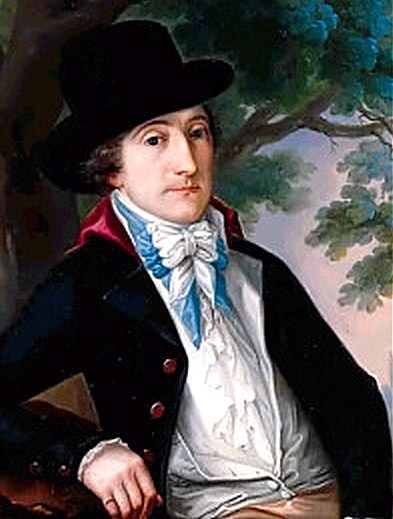Wojciech Boguslawski (Wojciech Boguslawski)

Actor, Director, Producer, Playwright. “The Father of Polish Theatre”, he devoted his 50-year career to disseminating nationalist ideals and broadening his homeland’s cultural horizons through drama. The son of nobility, Boguslawski was born at the family estate in Glinno, near Poznan, Poland. As a teen he was an avid participant in amateur theatre, but in 1775 he was sent to Warsaw for officer training in the Polish Army. In Eastern Europe it was common for authors to write short comedies for private performance by military officers, often suspect material that censors would bar from public venues. Franciszek Bohomolec wrote such a piece for Boguslawski and his fellow cadets, a two-act skit called “Misery Made Happy” (1777). The enterprising Boguslawski adapted the text into an opera libretto and approached local composer Maciej Kamienski to write the music. Premiered by the National Theatre at Warsaw’s Radziwill Palace on July 11, 1778, it broke ground as the first Polish opera. Its success led Boguslawski to resign from the army and become an actor with a travelling stage company. He joined the National Theatre in 1781 and became its director the following year. A born theater man, he was gifted not only as an actor-director but as a bass singer, playwright, and a producer with patriotic aspirations. With the support of Stanislaw August Poniatowski, the last King of Poland and Lithuania, Boguslawski established a new theatre in Vilnius, guiding it for five years (1785 to 1790). His most controversial production there was the Polish premiere of Beaumarchais’ revolutionary comedy “The Marriage of Figaro” (1786). Boguslawski’s second stint as head of the National Theatre (1790 to 1794) reflected the turbulence of the times, especially after the Second Partition (1793) by Russia and Prussia had reduced Poland to a third of its former size. He put on comedies with political themes and wrote two of his own, “Proof of the Nation’s Appreciation” (1791) and “Henry VI on a Hunting Excursion” (1792). He then collaborated with composer Jan Stefani for his most famous work, the full-length opera “The Presumed Miracle, or Krakovians and Highlanders”. Premiered a month before the start of the Kosciuszko Insurrection (March 1794), it met with a euphoric acclaim that had citizens singing its arias in the streets. The opera’s insurgent intent was clear enough for Russian authorities to ban it after three performances and issue a warrant for Boguslawski’s arrest, which he avoided through the intercession of important friends. With Kosciuszko’s defeat in November the National Theatre was closed. Boguslawski escaped to Lemberg (now Lviv, Ukraine), taking the theatre’s library and most of its costumes and props with him, and resumed producing plays. There he revived a censored version of “Krakovians and Highlanders” (1796) and gave the first Polish production of “Hamlet” in 1797, playing the title role. The music drama “The Amazons” (1797) began his long collaboration with composer Jozef Elsner. The National Theatre reopened in 1799, with Boguslawski restored to his post and Elsner joining him as music director (a position later shared by Elsner’s protege Karol Kurpinski). In 1801 the Prussian government banned him from theatrical activity in their zone of occupied Poland, on pain of imprisonment, for writing political pamphlets; this time he used his influence with high-ranking Freemasons to get the ban lifted. Interestingly, he mounted the Polish premiere of Mozart’s “The Magic Flute” in Warsaw soon afterwards (in 1802) – he and Mozart were also Freemasons and the opera is believed to have strong Masonic influences. Besides encouraging native talent, Boguslawski introduced Shakespeare, Racine, Molière, Voltaire, Beaumarchais, Diderot, Schiller and Lessing to the Polish stage, in his own translations or in adaptations he tailored for local audiences. In all he wrote over 80 stage works, including opera and ballet librettos. As an actor he preferred to play common folk in comedies but continued to tackle weightier leads, such as King Lear in 1805. In 1811 he founded Poland’s first School of Drama, setting down his theories in the textbook “Dramaturgy” (1812). Boguslawski resigned the directorship of the National Theatre in 1814 but remained connected with it as an advisor and through his touring company. He gave his last performance in 1827. Shortly before his death he initiated the construction of a new building for the National Theatre, which was completed in 1833. (It was destroyed by German bombs during World War II and reconstructed in 1965). Boguslawski has long been regarded as one of Poland’s great cultural heroes. In 2007, an urn containing earth from his grave at Powazki Cemetery was buried in a “symbolic transfer” at his birthplace in Glinno. (bio by: Bobb Edwards)
Born
- April, 09, 1757
- Poland
Died
- July, 07, 1829
- Poland
Cemetery
- Powazki Cemetery
- Mazowieckie
- Poland

